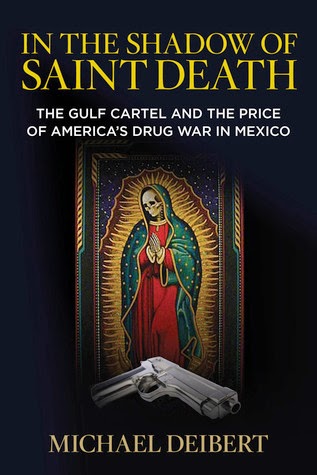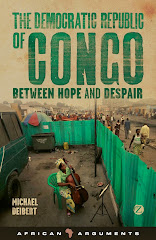My review of journalist Anna Politkovskaya's new book A Russian Diary: A Journalist's Final Account of Life, Corruption, and Death in Putin's Russia, is the lead book review in today's Miami Herald. As Herald links tend to become defunct after a few week's time, I am reposting the review in its entirety here. To read the original review, please click on the link below. MD
Posted on Sun, Jul. 29, 2007
NONFICTION A RUSSIAN DIARY
RUSSIAN ROULETTE
SLAIN JOURNALIST OPPOSED TO THE PUTIN GOVERNMENT PUTS FORTH AN IMPASSIONED ARGUMENT ABOUT HER COUNTRY'S FAILURES
BY MICHAEL DEIBERT
''The more I think about it, the more I would be betraying these people if I walked away,'' the Russian journalist Anna Politkovskaya told an interviewer in 2002. ``The only thing to do is to take this to the bitter end, so that no one can say that when things became difficult, I ran away.''
Politkovskaya, who served as a special correspondent for Novaya Gazeta newspaper, did not run away, and whomever ordered the assassins' bullets that cut her down outside of her Moscow flat in October 2006 failed to still the echoes of that voice, a fact her newly published book powerfully brings home.
An uncommonly eloquent and impassioned voice for what she saw as the destruction of Russia's nascent democracy under the rule of President Vladimir Putin, Politkovskaya made her name reporting from the ground in the most brutal days of Russia's war in Chechnya, painting vivid and often shocking portraits of the agony inflicted on civilians there by Russian forces, Chechen warlords and Islamist rebels alike, and how actors on many sides of the conflict cynically profited from the destruction. Her earlier book A Small Corner of Hell remains a definitive portrait of the conflict.
Later, as the bloodshed spilled to neighboring Caucasus regions such as Ingushetia, North Ossetia and Moscow itself, Politkovskaya reported that, too, and set the stage for A Russian Diary 's account of the ways in which Chechnya was the template for the deformed authoritarian state that, in Politkovskaya's view, has taken present-day Russia by the throat and has no intention of letting go.
Here at first-hand we see the violence and fraud that surrounded Russia's 2003 parliamentary elections and 2004 presidential elections: Candidates opposing Putin's United Russia party receive body parts in plastic bags; in Chechnya, the amount of votes cast is 10 percent more than there are registered voters; a steady, casual and cynical co-opting of other journalists and human rights activists by the state marches forward with disturbing regularity. It is a state that Politkovskaya reveals to be brutal and incompetent. It is hard to read of the callous treatment of the relatives of victims of the 2002 Dubrovka theater siege (where Chechen militants seized a Moscow theater, and security services responded by pumping in an unknown chemical agent that killed three times as many hostages as it did attackers), or that of the grieving parents of the Beslan school siege two years later (an even-worse terrorist outrage and government failure which killed more than 300, mostly children) and not share Politkovskaya's righteous anger.
Throughout the book we see the face of the new Russia that Politkovskaya believes is being constructed, and it is not a pretty picture. We see it in Ramzan Kadyrov, the Moscow-backed current president of Chechnya, portrayed as a ranting, uneducated thug in a long interview that Politkovskaya conducted in August 2004. Kadyrov has been accused of directing the abduction, torture and murder of hundreds, perhaps thousands of people. We see the face of the new Russia in the bat-wielding pro-government shock troops of the Nashi (''Ours'') movement, whose similarity to another political youth wing 70 years earlier in another European country appears to be more than simply alliterative.
And yet there are also stories of immense courage and resilience in the midst of what appears to be overwhelming, unyielding state machinery and popular apathy (at one point Politkovskaya witheringly compares modern Russian society to ``a collection of windowless, isolated concrete cells'').
Opposition politician Irina Hakamada stands against Putin in the 2004 ballot and declares that ''I am going into this election as if to the scaffold. . . . There are normal people in Russia who know what they [the Putin government] are up to.'' Observe the unexpected courage and grace of the oligarch Mikhail Khodorkovsky, condemned to prison when the Russian state set its sights on Yukos, the petroleum company he controlled. Also flitting like a ghost through the diary entries is Alexander Litvinenko, the former lieutenant-colonel in the Federal Security Service (a successor to the KGB) who went into exile in London and became one of the most bitter and vocal critics of the Putin government. Following Politkovskaya's murder, Litvinenko spoke out strongly, accusing Putin of involvement. A month later he followed her to the grave, poisoned after meeting with another former Russian spy.
Though the overall tone is not one of defeat -- Politkovskaya introduces us to many ex-servicemen, pensioners and victims of terrorism fighting for their rights -- there is a palpable gloom that pervades the book, a sense that, before getting any better, things will get much, much worse and that, when any change comes, it is likely to be bloody.
In an entry from October 29 2004, almost exactly two years before her own murder, Politkovskaya penned a bitterly eloquent epitaph for what she saw as having become of modern Russia. ``Any of us might now go to buy bread and never return. . . . The Russian people remained silent, hoping it would be the neighbors they would come to get.''
Michael Deibert is the author of Notes from the Last Testament: The Struggle for Haiti.
Sunday, July 29, 2007
Russian Roulette
Subscribe to:
Post Comments (Atom)




No comments:
Post a Comment